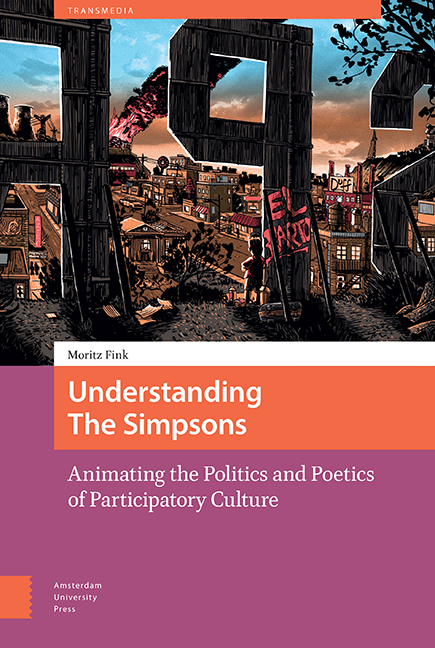Book contents
- Frontmatter
- Dedication
- Contents
- List of Images
- Acknowledgments
- Preface to the AUP Edition
- Introduction
- 1 Bart Talks Back: The Politics and Poetics of Participatory Culture
- 2 Alternative TV: The Genesis of The Simpsons
- 3 More than Just a Cartoon: Meta-Television Culture and the Age of Irony
- 4 High Fives on Prime Time: Representing Popular Culture
- 5 At the Edge of Convergence Culture: Engaging in the Simpsons Cult
- 6 Echoes of Springfield: The Simpsons in Remix Culture
- Conclusion: The Simpsons, Cultural Feedback Loops, and the Case of Apu
- Bibliography
- Index
1 - Bart Talks Back: The Politics and Poetics of Participatory Culture
Published online by Cambridge University Press: 21 October 2021
- Frontmatter
- Dedication
- Contents
- List of Images
- Acknowledgments
- Preface to the AUP Edition
- Introduction
- 1 Bart Talks Back: The Politics and Poetics of Participatory Culture
- 2 Alternative TV: The Genesis of The Simpsons
- 3 More than Just a Cartoon: Meta-Television Culture and the Age of Irony
- 4 High Fives on Prime Time: Representing Popular Culture
- 5 At the Edge of Convergence Culture: Engaging in the Simpsons Cult
- 6 Echoes of Springfield: The Simpsons in Remix Culture
- Conclusion: The Simpsons, Cultural Feedback Loops, and the Case of Apu
- Bibliography
- Index
Summary
Abstract
This chapter traces the concept of participatory media culture as it has emerged from the field of cultural studies and evolved through the work of John Fiske and Henry Jenkins. Building on Fiske's thinking, Jenkins’s scholarship on media fandom has fundamentally revised cultural studies’ traditional neo-Marxist perspective of (sub-)cultural resistance versus an assumed dominant ideology. In order to outline a theoretical framework for this study, the chapter reconsiders the concept of participatory culture and specifies its political as well as its poetic particularities. In addition, I discuss popular culture's participatory character in relation to Fiske’s notion of popular cultural capital and what I call “popular semiosis.”
Keywords: cultural studies, John Fiske, Henry Jenkins, participatory culture, media fandom, convergence culture
“The kids in TV land are being duped!” squeaked a talking Bart Simpson doll from amid the flood of merchandise and memorabilia as The Simpsons went big in the early 1990s. Packaged in the self-referential, irreverent language that would define the original Simpsons style of satirical humor, the statement also captured one of the series’ main qualities. Suitably conveyed by Bart, as an emblem and role model for the post-MTV generation, The Simpsons emphasized the meaning of media knowledge and ironic distance necessary to navigate an all-encompassing media culture.
Bart, in that sense, functions as the spokesperson for the show's writers as well as for a whole generation of viewers, when the ten-year-old rascal defiantly talks back to those traditionally accepted as social authorities— parents, priests, politicians, police, teachers, the media, you name it. This antiauthoritarian spirit also characterizes a sequence inserted at the last minute as an alternate opening for the 1992 rerun of the Season 3 episode “Stark Raving Dad” (1991). In the added scene, we see an animated TV set framing original footage of George H. W. Bush's 1992 election campaign speech at the National Religious Broadcasters, where Bush argued American families needed to be “a lot more like the Waltons and a lot less like the Simpsons!”
- Type
- Chapter
- Information
- Understanding The SimpsonsAnimating the Politics and Poetics of Participatory Culture, pp. 37 - 62Publisher: Amsterdam University PressPrint publication year: 2021



